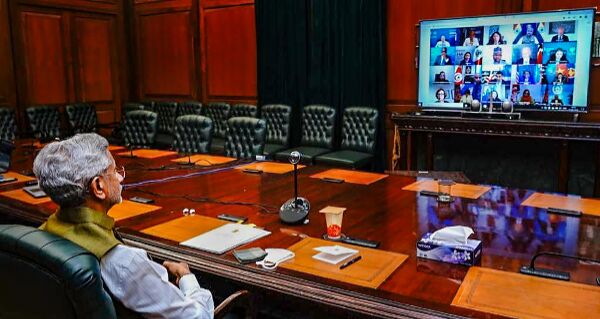A stand for peace
S Jaishankar proposed India's support for 'double peace' in Afghanistan at the UNSC meet and highlighted continued assistance to the country despite Pakistan's resistance

In his statement at the UN Security Council debate on the UN Assistance Mission in Afghanistan on June 22, India's External Affairs Minister S Jaishankar stated that India is concerned about the spike in violence in Afghanistan and has been strongly pressing for a comprehensive ceasefire.
Tragically, the sordid saga of Afghanistan shows no signs of ending. For centuries, this hapless land has been in the grip of a vicious circle of violence and bloodshed, with the balance of power shifting back and forth between warring tribal groups, leaving instability and abject poverty in the wake. Caught in the middle are ordinary Afghans, who have borne the brunt of the excesses of conflict. The UN Secretary-General report issued last week reaffirmed that the intra-Afghan talks have not resulted in a reduction of violence in Afghanistan.
The peace deal which the Trump administration reached with the Taliban on February 29 last year affected the interests of the Afghan government very adversely. The US had agreed to withdraw its troops completely by May 1, 2021— which Biden has postponed till September 11, 2021, the 20th anniversary of the 2001 attacks. Moreover, the US agreed to lift sanctions against the Taliban. In return, the Taliban agreed not to allow al-Qaeda or any other extremist group to operate in the areas they controlled. Additionally, the deal also provided for a prisoner swap between the Taliban and Afghanistan government.
If Trump really wanted to bring peace to Afghanistan, then the withdrawal should have been made only after the talks between the Afghan government and the Taliban reached an acceptable outcome. By announcing the withdrawal timetable in advance, Trump played into the hands of the Taliban and their backers in the Pakistani government, especially the ISI. The Taliban quickly realised that Trump had made up his mind to pull out US troops, and they built their strategy around procrastination and erecting obstacles in their talks with the Kabul.
It must be noted that the US knows full well what is happening on the ground. General Kenneth McKenzie, head of the US Army Central Command (CENTCOM) said in February 2021 that the Taliban are clearly responsible for violence in Afghanistan, with civilians and Afghan security forces taking the brunt of the bloodshed.
The long-awaited intra-Afghan dialogue between the Kabul government and the Taliban started on September 12 last year but it was stalled and is far from achieving any results. The talks have hardly made any progress on some basic sticking points. The Afghan government backs the current socio-political system, while the Taliban wants to reimpose its version of Islamic law as the country's system of governance. The Taliban, who are Sunni hardliners, are insisting on adherence to the Hanafi school of Sunni Islamic jurisprudence, but the government negotiators say this could be used to discriminate against Hazaras, who are predominantly Shia, and other minorities in the country.
Jaishankar said: "For enduring peace in Afghanistan, terrorist safe havens and sanctuaries must be dismantled immediately and terrorist supply chains disrupted." In a veiled attack on Pakistan, he further said: "Those providing material and financial support to terrorist entities must be held accountable".
He also rightly said, "A durable peace in Afghanistan requires a genuine "double peace" — peace within Afghanistan and peace around Afghanistan. It requires harmonising the interests of all, both within and around that country".
As is well known, this 'double peace' is being derailed by Pakistan, which has always tried to create strategic depth for itself in Afghanistan. It wants unhindered use of Afghanistan's territory to further its own nefarious designs. Pakistan wants to ensure that India is prevented from having any role in Afghanistan. The Pakistan Foreign Office spokesman Mohammad Faisal had unambiguously enunciated his country's position in January 2019 when he had said "India has no role in Afghanistan".
Ordinary Afghans see India as a friend and have high regard for it. For post-Taliban Afghanistan, India has been a steadfast partner and has supported it with over USD three billion in development assistance, far more than it has provided to any other nation. The partnership is built on the specific needs and requirements worked out with the government of Afghanistan.
India's assistance has taken various forms such as scholarships to students, infrastructure and transportation projects, medical teams to treat Afghans, and building institutional capacities at the ministry level. The USD 290 million Afghan-India Friendship Dam (also known as the Salma Dam), the USD 90 million Afghan Parliament building in Kabul and the USD 135 million Delaram-Zaranj highway are just some examples. India has also pledged to provide USD 236 million for building a second dam on the outskirts of Kabul. The Shahtoot Dam, as it will be named, is planned to be completed in the next three years.
To provide greater regional connectivity, India has operationalised air freight corridors and the Chabahar Port. India also extended humanitarian assistance of 75,000 MT of wheat to Afghanistan through the Chabahar Port to overcome food insecurity during the pandemic. Further, as a part of its endeavour to help Afghanistan tide over the COVID-19 pandemic, India has supplied vaccines to Afghanistan, both bilaterally and through the COVAX facility.
Afghanistan is at a critical juncture and the United Nations needs to step up its role. As Jaishankar puts it, "We support a leading role for the United Nations, since that would help improve the odds for a lasting and durable outcome."
In this evolving scenario, India's role in Afghanistan assumes greater significance and could be helpful for the Afghan government as well as for ordinary Afghans. As Jaishankar said, "India continues to stand with Afghanistan in ensuring restoration of normalcy through a legitimate democratic process that is essential for the long-term stability of Afghanistan and the region".
Views expressed are personal



